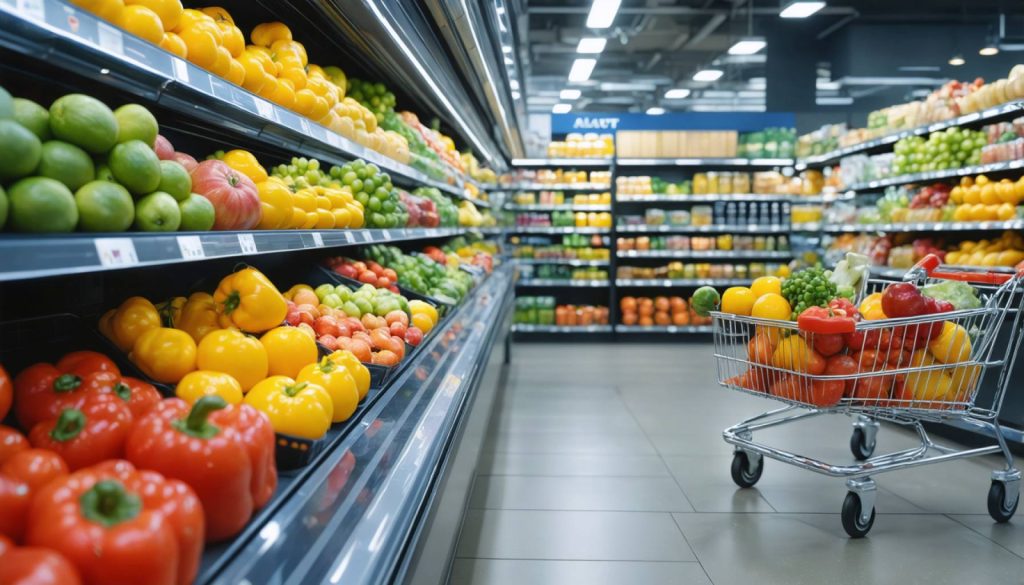
- Artificial Intelligence (AI) is transforming the supermarket experience with personalized shopping journeys through tailored recommendations.
- Smart shelves with IoT sensors manage stock levels in real-time, reducing the chance of empty shelves and enhancing store operations.
- AI helps minimize food waste with predictive algorithms optimizing orders and maintaining fresh produce, supporting sustainability
- AI-powered checkout systems offer faster, cashier-less experiences, increasing convenience and reducing wait times.
- Supermarkets utilize AI to analyze consumer feedback, continuously refining and personalizing the shopping experience.
- Overall, AI integrates seamlessly into traditional shopping environments, enriching experiences and supporting eco-friendly practices.
Wander through the aisles of your local supermarket and you might notice subtle changes. Sleek touchscreens, smart shelves, and interactive kiosks are transforming the shopping experience. The driving force behind this modern shift? Artificial Intelligence (AI).
Imagine walking into a store and having a personalized shopping journey crafted just for you. This isn’t science fiction—it’s AI in action. These intelligent systems analyze your shopping habits and preferences, offering tailored recommendations to guide you through your list with ease. No more wandering aimlessly through crowded aisles; AI ensures you find everything you need efficiently.
AI’s influence stretches beyond mere convenience. It transforms store operations, enhancing the way supermarkets manage their stock. Smart shelves embedded with IoT sensors track inventory levels in real-time. When stock dwindles, the system automatically signals a restock, reducing the likelihood of empty shelves and ensuring you get your favorite cereal each time.
For the eco-conscious shopper, AI brings the promise of reduced food waste. Predictive algorithms analyze purchasing patterns and shelf life data to optimize orders, minimizing unnecessary stock and keeping fresh produce on display. These systems not only cut costs but also contribute to a more sustainable environment.
Imagine checking out without waiting in long lines. AI-powered checkout systems scan items instantly and process payments with speed and accuracy, freeing up your time for more enjoyable activities. Some stores even offer cashier-less experiences, where hidden cameras and sensors detect items you pick and charge your account seamlessly as you exit.
Despite the technological marvels AI brings, the heart of this transformation lies in enhancing human experiences. Supermarkets use feedback loops, integrating consumer insights to refine services constantly. The result? A shopping experience that feels intuitive, welcoming, and personalized.
Key takeaway: AI is revolutionizing every aspect of supermarket shopping, marrying technology with tradition to deliver a seamless, personalized, and eco-friendly experience. Embrace these advancements, as they redefine our interactions with everyday spaces.
AI isn’t just about creating futuristic possibilities; it’s about forging a better path for us all, enriching the mundane with the magic of technology. As these intelligent systems continue to evolve, they promise to make our shopping trips more delightful, ensuring that technology serves humanity’s highest aspirations.
Feel the excitement permeating your next grocery run—it just might be your best yet!
Discover How AI is Revolutionizing Grocery Shopping: The Future is Here
Introduction
In today’s fast-paced world, artificial intelligence (AI) plays a pivotal role in transforming everyday experiences, with grocery shopping being no exception. As we embrace this digital revolution, it’s essential to delve deeper into the AI-driven changes reshaping the supermarket landscape. This article explores various facets of AI integration in supermarkets, providing readers with actionable insights, market forecasts, and industry trends.
AI in Supermarkets: Beyond the Basics
AI’s integration in supermarkets goes beyond just offering convenience. Here are critical areas where technology is making a significant impact:
1. Personalized Shopping Experience: AI and machine learning algorithms analyze individual purchasing patterns to provide a tailored shopping list and offer personalized discounts. According to a study by McKinsey, personalization can boost store revenues by 15-20%.
2. Enhanced Inventory Management: Beyond just restocking alerts, AI predicts future demands using real-time analytics, which reduces overstock and minimizes waste. This efficient management system helps supermarkets maintain a balance between supply and demand.
3. Improved Customer Service with AI Chatbots: According to research by Gartner, by 2025, the majority of customer service interactions will be handled by artificial intelligence, providing instant responses to common inquiries, such as locating items or recommending substitutes.
4. Advanced Security Measures: AI-powered surveillance systems offer unparalleled security, thwarting theft through real-time monitoring and predictive threat detection. These systems safeguard stores while ensuring a seamless customer experience.
5. Sustainability Practices: With AI, supermarkets can further their sustainability goals. Predictive analytics help in planning product lifecycles, promoting eco-friendly packaging, and adopting energy-efficient systems that minimize their carbon footprint.
Market Forecasts and Industry Trends
AI technology in the retail sector is anticipated to grow rapidly. A recent report by MarketsandMarkets estimates that the AI in the retail market is projected to reach $20 billion by 2026, at a CAGR of 35.9% from 2021 to 2026. This growth highlights the mounting importance of AI innovations in reshaping the retail space.
Life Hacks and How-To Steps for Shoppers
– Maximize Personalized Offers: Engage with supermarket apps to receive custom offers that suit your buying habits. These can save you money over time.
– Embrace Eco-Friendly Choices: Utilize AI-powered apps to identify sustainable products, making environmentally conscious decisions easier.
– Watch for Smart Shelf Signals: Learn to recognize digital signage or app notifications for real-time stock updates, ensuring you never miss out on your favorite products.
Pros & Cons of AI in Supermarkets
Pros:
– Improved shopping efficiency and experience
– Reduction in food waste
– Enhanced inventory management
– Fast and convenient checkout processes
Cons:
– Privacy concerns with data collection
– Initial setup and maintenance costs
– Potential job displacement due to automation
Controversies and Limitations
While AI presents numerous benefits, it’s crucial to address ethical considerations, such as privacy concerns over data collection and potential biases in algorithmic recommendations. Establishing robust policies and transparent data practices will be key to overcoming these challenges.
Conclusion
Incorporating AI in supermarkets holds tremendous potential to enhance the shopping experience, streamline operations, and contribute to sustainability. Supermarkets and brands must embrace technological advancements while addressing consumer concerns to harness AI’s full potential responsibly. As a shopper, leveraging AI tools and apps can enrich your grocery shopping journey, making it more efficient and enjoyable.
For further insights on AI in technology and its applications, visit the Forrester website. Explore how the future of retail is being transformed by AI-driven insights and innovations.
Quick Tips
– Download and use supermarket apps to receive AI-driven recommendations and promotions.
– Stay informed about new AI technology developments in your preferred stores.
– Engage in sustainability initiatives by choosing products optimized by AI for minimal waste.
Get ready for an enhanced, efficient, and eco-friendly shopping experience at your favorite supermarket!



